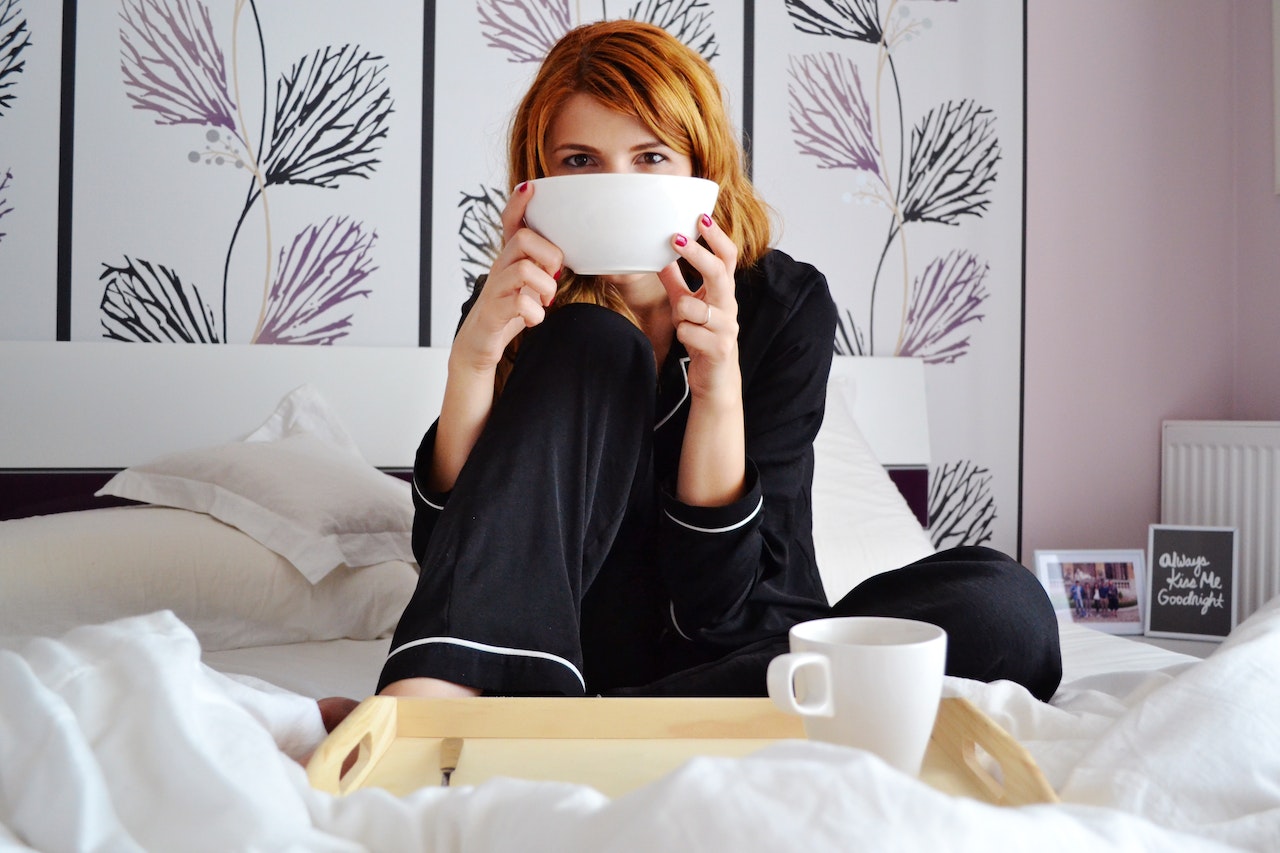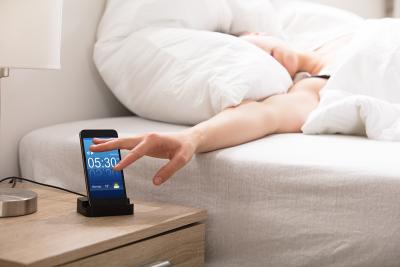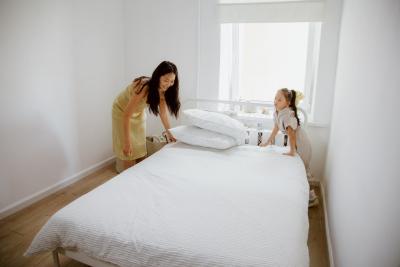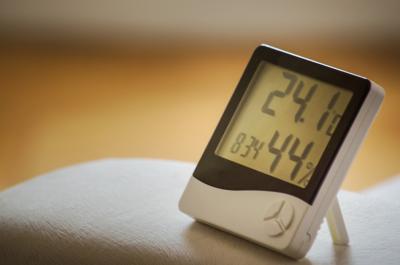Stress levels can significantly affect your sleep. This is because it can cause your heart rate to increase, breathing to become irregular and trigger your ‘fight or flight’ response, so it’s little surprise that you might struggle to sleep when your stress levels are high.
However, there are ways in which you can lower those levels and even understand what is causing you stress.
How does cortisol impact sleep?
Often known as the ‘stress hormone’, cortisol is essential for your body’s functioning and is the key hormone in your stress response. Among its many other functions, cortisol controls your sleep-wake cycle. But what does that mean?
You may be familiar with the circadian rhythm, which your sleep-wake cycle follows. In the morning, your cortisol levels are at their highest, helping you to wake, feel alert and get out of bed. For many, these levels peak at 9 am.
These levels gradually drop throughout the day to their lowest levels around midnight. On the other hand, melatonin - often known as your ‘sleep hormone’ - levels begin to drop in the morning as cortisol takes over, gradually increasing throughout the night to keep you asleep. Your sleep quality is impacted if this 24-hour cycle, or rhythm, is disrupted.
Can high cortisol levels prevent you from falling asleep?
Before the existence of artificial light, our sleep-wake cycle was regulated by the sun setting and rising. However, as more and more of us bring electronic devices into the bedroom - which produce artificial light - our melatonin levels can be hindered as that light can signal to the body to stop the production of your ‘sleep hormone’. With that process out of sync, cortisol levels in the morning can be affected - meaning you are less likely to feel alert in the morning. Therefore, some might turn to coffee in their time of need to get them ready for the day.
But did you know having high cortisol levels can also affect your ability to sleep?
Cortisol is produced by the hypothalamic pituitary adrenal (HPA) axis - a complex network. Studies have shown you can suffer from sleep disturbances when the HPA axis is overactive. This can include insomnia and less time spent asleep, leaving you feeling groggy and unable to wake the following day. In response, your body could attempt to produce more cortisol throughout the day to ‘wake you up’, and the cycle continues.
So, what affects your cortisol levels, and how can you enjoy better sleep?
8 tips for lowering your cortisol levels before bedtime

1. Carve out just 10 minutes with your pet for better sleep
We imagine this is not a difficult request. But 10 minutes of playing or stroking your pet can lower cortisol levels. This study was tested on students suffering from high cortisol levels due to exams. The researchers discovered that those students who directly interacted with animals had lower cortisol levels in their saliva.
So, if that’s not an excuse to cuddle your pet before bed - before an exam, work or a hectic day - we don’t know what is.

2. Stop exposure to bright light two hours before bedtime
As mentioned earlier, artificial light can hinder melatonin production or your ‘sleep hormone’. This hormone works with cortisol but helps you sleep, whereas cortisol makes you feel alert. But bright light can stop this process, impacting your ability to sleep and wake up in the morning. That’s why you might have noticed you suffer from disrupted sleep in summer, as it takes longer to get dark.
You need to reduce exposure to bright light at least two hours before bed. What that means is limiting exposure to TV and even going so far as putting your phones in a drawer if you are unable to stop scrolling at night.

3. A cup of tea a day keeps the cortisol levels at bay…
Our love story with tea has spanned many generations. You might have heard from your grandmother that a cup of tea can solve anything. But can it? A study discovered that black tea could aid stress recovery by testing a group of participants. The results highlighted how ‘6 weeks of tea consumption leads to lower post-stress cortisol and greater subjective relaxation’.
However, it’s important to remember that tea - depending on the type you drink - contains caffeine, so we recommend opting for a cuppa at least six hours before bedtime to ensure the caffeine does not disrupt your sleep that night. We’ve even shared our favourite coffee alternatives to help you sleep.

4. Go outside for just 17 minutes each day
We’ve previously identified forest bathing as the ‘key to a better night’s sleep’, and that’s certainly no understatement.
The outdoors can do wonders for your cortisol levels, and just 17 minutes outside, soaking up the sounds, sights and textures of the outdoor world can significantly lower your stress levels. So much so that it can even help set a sleep routine for insomnia and reduce any negative, ruminative thoughts that keep you awake at night.

5. Take inspiration from a Mediterranean diet
A Mediterranean diet includes foods from countries bordering the Mediterranean Sea - think Spain, Italy, France and Greece. This diet is high in plant foods, such as fruits, vegetables and whole grains. Previous studies have shown that the Mediterranean diet reduces cortisol response to acute stress and could help if you suffer from impacted sleep.
To incorporate the foods into your diet, start with vegetables, fruits and nuts. This diet is also typically lower in animal products and high in plant food and fish.

6. Practice deep breathing or take a yoga class
Do you take time for yourself when you feel stressed or try to plough on? Taking time to practice deep breathing - even if it is just for five minutes - is a simple technique for reducing stress you can do anywhere, from your commute to your lunch break to hanging out the washing.
Researchers have discovered that cortisol levels - identified in saliva - were reduced by deep breathing techniques. If you need help figuring out where to start, search for deep breathing routines on YouTube. Alternatively, apps such as Apple Fitness boast 5-minute meditation videos you can do throughout your day.

7. Understand what triggers your stress levels
Understanding what causes your stress levels to rise could be your way to reducing them. If you can, identify and write down what increases those levels to avoid them.
For instance, you can recognise if your stress levels begin to rise by changes in breathing, heart rate and other tension in your body. It might be something as simple as working late into the night that you notice affects your stress levels. If that is the case, set a time when you stop work and move away from the screen to let yourself decompress and relax before the next working day.

8. Wake up at the same time each day, even on the weekends
A strong sleep routine is the foundation for ensuring a healthy sleep-wake cycle. Inconsistent bedtimes and morning rises can stop your brain from understanding when it is time to sleep. You might recognise this if you consistently go to bed late but have tried to take an early bedtime due to an important task the next day. However, instead of going to sleep, you have spent hours staring at the ceiling…
A consistent sleep schedule will ensure your brain understands the signals for going to sleep and waking up. Review your week and come up with a realistic time for bed - mainly if you are a night owl - and a time for waking up that allows you to complete all morning tasks without rushing around and reaching for coffee as an aid.












